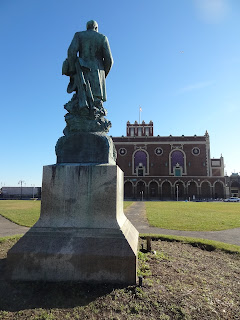Dec.
21, 2017
Just
in time for the holidays, WNYC fired Lenny Lopate and Jonathan Swartz, and is
still reviewing others that may face the same fate – a risk manager’s nightmare
for a super liberal station.
This
comes as a knee-jerk reaction by risk managers and liberal elite in a new
purge, not overtly political in that most of the men accused nationwide lean
towards the liberal side of the social barometer, yet part of a backfired
attempt to bring down a president Liberals tried to paint as misogynistic, who won’t be moved by this
misguided mistaken superior morality liberals have adopted.
This latest example of national hysteria is
part of a human curse as we continue to follow a lemmings-like path off each
new exaggerated cliff, a thoughtless mob mentality that strips of us of the
better part of civilized behavior liberalism boasts to protect.
Listeners defending Lopate complained about the
closed door hearings that made this whole political circus seem like a
Stalin-like political purge, which it largely is, and where we are forced to
settle for a statement issued by manage justifying why they fired him.
But like the rest of liberal media, WNYC cannot
affords to have a disorderly house as they rant and rave about how foul Trump
and GOP are, and so instead of reeducation and sensitivity training that a
politically-protected Civil Service employee such as a cop would get, these
unprotected broadcasts like Lopate get the boot – demonstrating to the world
that the liberal left can be just as fascistic as they claim the right is.
I’ve known Lopate as a listener and a member of
the WBAI community long before he worked his way onto WNYC. While he was often
arrogant, sometimes on the verge of abusive, he was also the most knowledgeable
and insightful broadcaster I have even heard. I will miss him around Christmas
and Easter when he put a stunning gospel music show.
Yet Lopate never really completely toe the
liberal line, speaking his mind, sometimes in harsh terms to an audience lulled
into comfortable sleep by other broadcasters at WNYC. Unlike these others, Lopate may not have been
liberal enough. This is not to imply a conspiracy against him. But it clearly
provided WNYC with additional motive for firing him rather than providing him
with an opportunity at redemption, the station refusing to rally around someone
who did not complexly embrace the propaganda the station broadcasts day in and
day out.
Independent thinkers like Lopate are dangerous
to both sides of the political spectrum in a civil war that pits one American
against another, and it is often easier to stab one of your own in the back then
to allow someone like Lopate to be used as a propaganda item by the other side,
a sad commentary to these morally questionable times in which we live.





